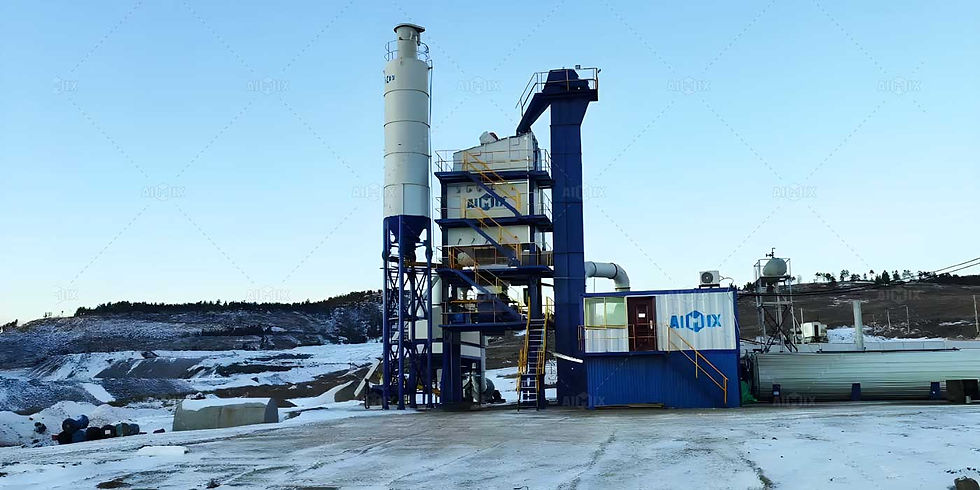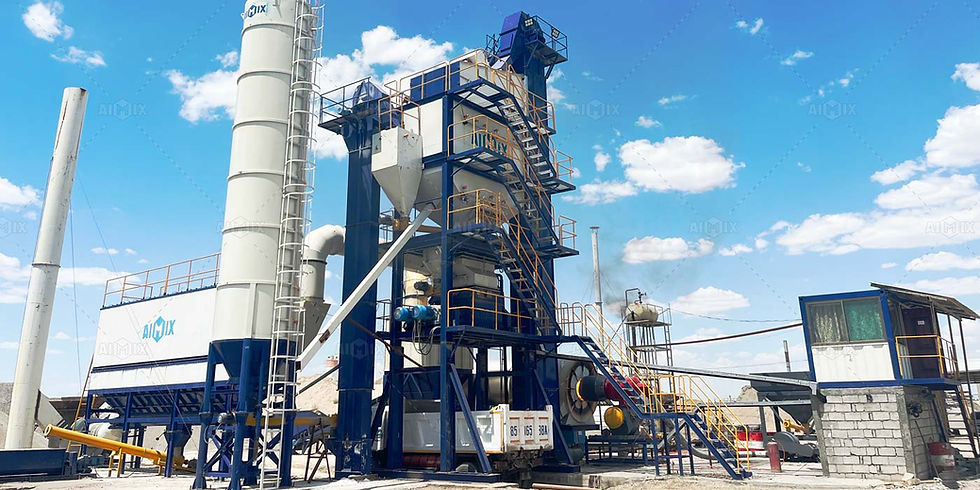How Much Does a 120 TPH Asphalt Mixing Plant Cost for Daily Production of 1,200–1,500 Tons of Asphalt?
- aimixglobal5
- Jun 25, 2025
- 4 min read
When planning asphalt production for large-scale road and bridge projects, many contractors and construction companies ask this critical question: how much does an asphalt plant cost for 120tph? Understanding the actual investment helps companies control budgets, reduce asphalt purchasing costs, and improve overall project profitability. In this article, I will guide you through key cost factors, practical considerations, and help you evaluate whether a 120 TPH asphalt plant is the right choice for your project needs.

Why Choose a 120 TPH Asphalt Mixing Plant for 1,200–1,500 Tons Daily Production?
If you need to produce 1,200 to 1,500 tons of asphalt per day, a 120 TPH asphalt mixing plant offers an efficient and cost-effective solution. Compared to smaller capacity plants, the 120 TPH plant can meet the daily production target within 10–12.5 hours of operation, ensuring enough material for continuous paving activities without delays.
For road construction contractors, time is money. An asphalt mixing plant with this capacity helps you reduce equipment idle time and minimize asphalt transportation from external suppliers. In many cases, owning your own plant at the job site can lower asphalt material costs by up to 30% compared to purchasing from commercial plants.
Seamless Project Progress
With a 120 TPH asphalt plant, you can manage your project schedule more flexibly. You won’t need to depend on third-party asphalt supply, which can sometimes cause delays. This is especially important for highway construction, airport runways, and municipal road works where daily progress targets are strict.

Key Factors That Affect the Cost of a 120 TPH Asphalt Mixing Plant
Before making an investment, it’s essential to understand the components that determine the total cost. Several factors influence the asphalt plant price and operating expenses.
1. Type of Asphalt Plant: Batch or Drum
Batch asphalt mixing plants generally have a higher upfront cost than drum mix plants, but they provide better flexibility for different asphalt recipes. If you need to produce multiple asphalt mixtures in one day, a batch plant is a better choice. For continuous large-volume production, a drum plant is more economical.
2. Configuration and Optional Features
The price varies depending on whether you choose a basic model or a plant with advanced features like baghouse dust collectors, recycled asphalt mixing capability (RAP system), automatic control systems, or high-efficiency burners. These options improve asphalt quality and environmental performance but also increase the initial investment.
3. Transportation and Installation Costs
When selecting a plant, you need to calculate the shipping cost to your country or project site. In addition, foundation construction, installation, and commissioning services will add to the total cost. Portable mobile asphalt plants can help reduce installation time and save on relocation expenses.
4. Energy Consumption and Fuel Type
Choosing a plant with an energy-efficient drying system will save significant fuel costs in long-term operation. Diesel, heavy oil, natural gas, and coal are common fuel options. The availability and local price of each fuel type will directly impact your asphalt production cost per ton.

How Much Does a 120 TPH Asphalt Plant Cost?
The price of a standard 120 TPH asphalt mixing plant typically ranges from USD 200,000 to USD 400,000. This cost depends on the plant type, specific configuration, and brand reputation. Some suppliers offer highly customized solutions, which may push the price higher.
Besides equipment cost, you should also consider:
Shipping fees (based on the destination)
Customs clearance and taxes in your country
Installation, commissioning, and training fees
Spare parts and maintenance budget
When calculating the total investment, it is helpful to request a detailed quotation including all these elements to avoid unexpected expenses later.
Is It Worth Investing in a 120 TPH Asphalt Plant?
If you plan to produce asphalt daily for your own road construction or to sell to nearby contractors, investing in a 120 TPH asphalt plant can bring significant long-term benefits. For example, if you produce 1,500 tons per day and save $10–$15 per ton by self-producing asphalt instead of buying from others, you can save up to $15,000–$22,500 per day. Over several months, the plant can quickly pay for itself.
Besides cost savings, owning your own asphalt plant gives you production control, consistent material supply, and the flexibility to meet specific project requirements on demand.

Conclusion: Let AIMIX Help You Find the Right Asphalt Mixing Solution
Selecting the right asphalt plant is a key decision for your project success. If you are considering a 120 TPH asphalt mixing plant for daily production of 1,200–1,500 tons, I recommend working with a professional supplier who can offer you reliable equipment, customized configurations, and responsive after-sales support.
At AIMIX, we, as one of outstanding asphalt mixing plant manufacturers, have extensive experience in providing asphalt mixing plants for various road and bridge projects worldwide. Our local offices and after-sales teams in Indonesia can assist you quickly and efficiently. Contact us today for a personalized quotation and expert advice. Together, we can help you reduce asphalt production costs and ensure smooth project delivery.



Comments